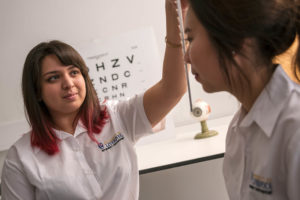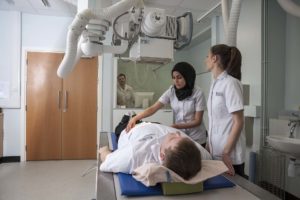Nursing
UCAS code B700
- Study mode
- Full-time
- Duration
- 3 years
- Start date and application deadlines
-
- Start date
- September 2026
- Apply by:
- Starts on:
UCAS code B700
We've set the country or region your qualifications are from as United Kingdom.
Studying Nursing at Liverpool will provide you with lifelong learning and working opportunities, as well as a strong focus on nursing leadership. You’ll gain valuable theoretical knowledge alongside extensive clinical experience in a variety of different settings.
Throughout your studies you’ll be equipped with the knowledge, skills and attributes you will need to meet the challenges of being a nurse in the changing context of healthcare, and to succeed in the modern National Health Service.
Cohorts are small, helping to ensure that our students receive the support they require to help them to get the best out of the programme.
Each year students will undertake a period of study in practice at a variety of different hospital Trusts across Merseyside and Cheshire.
Our programme seeks to produce graduates who are eligible to apply for registration in the field of Adult Nursing with the Nursing and Midwifery Council (NMC).

We’ve been awarded a Gold rating for educational excellence.
Discover what you'll learn, what you'll study, and how you'll be taught and assessed.
You will learn about the art and practice of nursing in your first year. All students will undertake one four week placement as an introduction to nursing patients in an acute setting, followed by two further placements, one of seven weeks duration and the other ten weeks.
Year one includes clinical skills modules, a practice module (incorporating all of the placements across the year), and theory modules to introduce physiology and pathophysiology, behavioural sciences and professional issues in nursing, including law and ethics.
Programme details and modules listed are illustrative only and subject to change.
Modules will develop knowledge and skills around effective assessment, planning, implementation and evaluation of care across a range of different conditions, which extend across the lifespan and span conditions affecting physical and mental health and well-being.
This year also focuses upon developing knowledge around caring for seriously ill individuals, and the importance of holistic assessment and planning to successfully prioritise individual need and shape decision-making using a collaborative approach.
During this year students will also be introduced to specific types of healthcare and nursing research including research methodology, data collection and analysis, and ethical considerations of research.
Students undertake three different placements of seven, four and eleven weeks respectively.
Programme details and modules listed are illustrative only and subject to change.
Specific focus in this year is on equipping you with the core nursing knowledge needed to be able to assess needs, plan, provide and evaluate care of people with advanced clinical needs and those who require palliation and end of life care. Teaching will also revolve around leadership and advancing skills to facilitate your proficiencies to manage care in a diversity of settings, working with a range of professionals and supporting new learners.
Your third year also includes a dissertation, for which support will be given to write a research proposal around an area of care within nursing that specifically interests the student.
Students undertake two placements of 10 and 12 weeks respectively.
Programme details and modules listed are illustrative only and subject to change.
Learning is promoted through a wide variety of activities that enable the students to become autonomous and continuous learners. Interactive lectures, practical and clinical skills group work, directed study, role play, problem-based learning, small group work, student-led seminars, collaborative project work and interactive tutorials are key learning strategies of the programmes.
Practical work using our imaging suite digital equipment, the Clinical Skills Resource Room and the Human Anatomy Resource Centre complements teaching activities.
Face-to-face interactions between all students will occur at shared lectures, tutorials and group work and online interaction will be encouraged and facilitated. There is also inter-professional education and learning opportunities across all Healthcare Professions programmes.
Using a mixture of coursework and examination, a range of assessment methods are used. These include seen and unseen written examinations, essay assignments with specific word lengths, multiple choice questions, case study presentations, video analysis and interactive practical examinations.
Assessment of the work-based learning element of the programme is an important aspect. You will be required to communicate your views orally and in written form; analyse, implement and evaluate your practice; and to extend the research and evidence base of your chosen profession.
The various methods of assessments have been chosen to provide a balance that will permit the undergraduates to demonstrate their intellectual abilities in all areas to the full.
We have a distinctive approach to education, the Liverpool Curriculum Framework, which focuses on research-connected teaching, active learning, and authentic assessment to ensure our students graduate as digitally fluent and confident global citizens.
The Liverpool Curriculum framework sets out our distinctive approach to education. Our teaching staff support our students to develop academic knowledge, skills, and understanding alongside our graduate attributes:
Our curriculum is characterised by the three Liverpool Hallmarks:
All this is underpinned by our core value of inclusivity and commitment to providing a curriculum that is accessible to all students.
Studying with us means you can tailor your degree to suit you. Here's what is available on this course.
Every student at The University of Liverpool can study a language as part of, or alongside their degree. You can choose:
The School of Allied Health Professions and Nursing provides you with every opportunity to hone your practical skills, with facilities including a virtual reality teaching suite, imaging suite, and a range of clinical practice rooms to facilitate simulated teaching. Our curriculum is developed and assessed by leading healthcare providers throughout the North West, who also provide exciting placement opportunities.






From arrival to alumni, we’re with you all the way:

I chose this course because it has an excellent reputation – it was a simple choice for me to make! I’m trained by the best academics who are always there to help me achieve my goal.

Want to find out more about student life?
Chat with our student ambassadors and ask any questions you have.
As a Nursing graduate from the School of Allied Health Professions and Nursing, you’ll be eligible to apply for registration with the Nursing and Midwifery Council (NMC).
You can look forward to a career in the National Health Service, Social Services or the private sector. You may also choose to pursue a career in teaching, research, or management.
Typical employers include:
99% of School of Allied Health Professions and Nursing students find their main activity after graduation meaningful.
(Graduates Outcomes, 2018-19.)
My qualifications are from United Kingdom.
Your tuition fees, funding your studies, and other costs to consider.
Full-time place, per year - £9,790
Year in industry fee - £1,955
Year abroad fee - £1,465 (applies to year in China)
Full-time place, per year - £32,000
Year in industry fee - £1,955
Year abroad fee - £16,000 (applies to year in China)
The fees shown are for the academic year 2026/27. Please be advised that tuition fees may increase each year for both UK and international students. For UK students, this will be subject to the government’s regulated fee limits.
Tuition fees cover the cost of your teaching and assessment, operating facilities such as libraries, IT equipment, and access to academic and personal support. Learn more about paying for your studies.
We understand that budgeting for your time at university is important, and we want to make sure you understand any course-related costs that are not covered by your tuition fee. This includes the cost of equipment, professional association fees, and travel to placements. Students may opt to undertake a placement overseas that would incur additional costs.
Students should expect to cover the following costs.
Equipment
Fob watch (£10.00)
Black shoes for work (£70.00)
Professional association fees
Optional (but very strongly recommended) Royal College of Nursing or Unison Student membership (£30.00)
Travel to placements
Students will complete approximately 63 weeks of placement experience. All clinical placements are a daily commute, therefore additional accommodation costs are not required. Student concessions are also available from local travel companies.
Elective placements
Elective placements are compulsory, but they do not necessarily incur costs. Students may opt to undertake a placement overseas (in which case there will clearly be a variable cost for this), but the student may also undertake their elective placement in the UK, and depending upon where the placement is, in relation to where the student is living, costs will vary.
*Home students are able to apply for reimbursement of travel/accommodation costs in relation to placement from the NHS Business Services Authority.
We’re showing the scholarships available to students from United Kingdom.
We offer a range of scholarships and bursaries that could help pay your tuition and living expenses.
If you’re a UK student joining an undergraduate degree and have a household income below £35,000, you could be eligible for a Liverpool Bursary worth up to £2,000 for each year of undergraduate study.
If you’ve spent 13 or more weeks in Local Authority care since age 14, you could be eligible for a bursary of £3,000 per year of study. You’ll need to be a UK student joining an eligible undergraduate degree and be aged 28 or above on 1 September in the year you start.
Are you a UK student with a Black African or Caribbean heritage and a household income of £25,000 or less? You could be eligible to apply for a Cowrie Foundation Scholarship worth up to £8,000 for each year of undergraduate study.
If you’re a UK student identified as estranged by Student Finance England (or the equivalent UK funding body), you could be eligible for a bursary of £1,000 for each year of undergraduate study.
Joining a School of Biosciences degree and have a household income of less than £25,000? If you’re a UK student, you could apply to receive £4,500 per year for three years of your undergraduate course.
Do you live in the Liverpool City Region with a household income of £25,000 or less? Did neither of your parents attend University? You could be eligible to apply for a Nolan Scholarship worth £5,000 per year for three years of undergraduate study.
Are you a UK student with a household income of £25,000 or less? If you’ve participated in an eligible outreach programme, you could be eligible to apply for a Rigby Enterprise Award worth £5,000 per year for three years of your undergraduate degree.
Are you a UK student with a household income of £25,000 or less? Did neither of your parents attend University? You could be eligible to apply for a ROLABOTIC Scholarship worth £4,500 for each year of your undergraduate degree.
Apply to receive tailored training support to enhance your sporting performance. Our athlete support package includes a range of benefits, from bespoke strength and conditioning training to physiotherapy sessions and one-to-one nutritional advice.
Joining a degree in the School of Electrical Engineering, Electronics and Computer Science? If you’re a UK student with household income below £25,000, you could be eligible to apply for £5,000 a year for three years of study. Two awards will be available per academic year.
Joining a Nursing, Occupational Therapy or Physiotherapy degree? If you’re a UK student with a Merseyside connection and a household income below £25,000, you could be eligible to apply for a £2,500 payment for each year of your course. Six awards are available per year.
If you’re a young adult and a registered carer in the UK, you might be eligible for a £1,000 bursary for each year of study. You’ll need to be aged 18-25 on 1 September in the year you start your undergraduate degree.
My qualifications are from United Kingdom.
The qualifications and exam results you'll need to apply for this course.
NHS Values will be assessed in all areas of an application, including UCAS Personal Statement and at interview. For more details, please download our explanation of Value Based Recruitment.
Previous certificated /experiential learning is recognised and may be accepted as meeting some programme outcomes. This may include both theory and practice achievement. The Nursing and Midwifery Council states that recognition of prior learning that is capable of being mapped to the Standards of Proficiency for Registered Nurses and programme outcomes should be permitted for up to a maximum of fifty percent of the programme.
However, the University of Liverpool’s Policy on Recognition on Prior Learning states that the maximum amount of prior certificated/ experiential learning that will be recognised is normally one third of the programme. Therefore, in accordance with the University’s policy, the maximum amount of credit for which a claim of recognition of prior learning can be made should equate to no more than one third of the BN programme.
Opportunities are available for those who may be eligible for recognition of prior learning: the award of credits on the basis of demonstrated learning which has taken place in the past and was at the higher education level. Support will be offered throughout the application process and assessment for recognition. Any queries relating to potential eligibility for recognition of prior learning should be forwarded to the admissions tutor for the BN programme.
| Qualification | Details |
|---|---|
| A levels |
BBC with a science subject, e.g. biology or a social science.You may automatically qualify for reduced entry requirements through our contextual offers scheme. Based on your personal circumstances, you may automatically qualify for up to a two-grade reduction in the entry requirements needed for this course. When you apply, we consider a range of factors – such as where you live – to assess if you’re eligible for a grade reduction. You don’t have to make an application for a grade reduction – we’ll do all the work. Find out more about how we make reduced grade offers. If you don't meet the entry requirements, you may be able to complete a foundation year which would allow you to progress to this course. Available foundation years:
|
| T levels |
T Levels in Health preferably with occupational specialism (supporting the adult nursing team) is accepted with an overall grade of Merit to include in the core. Applicants should contact us by completing the enquiry form on our website to discuss specific requirements in the core components and the occupational specialism. |
| GCSE |
3 GCSE subjects graded A*-C (grade 4) in English, Mathematics and a Science (Biology, Chemistry or Physics). Dual or Combined Science is also accepted. |
| BTEC | DDM |
| BTEC Level 3 Diploma | BTEC nationals are considered in addition to 3 GCSEs grades C/4, which must include English, Maths and a Science. BTEC National Extended Certificate: We will accept one National Extended Certificate at a minimum of Distinction. This must be accompanied by two A2 Levels at grade B. One A2 subject should preferably include a Biological Science. In total, between the two qualifications, three separate subjects must be taken. |
| BTEC Level 3 National Extended Diploma | BTEC National Diploma We will accept in Health and Social Care or Applied Science graded at DM. This must be accompanied by one A2 level subject at grade B. In total between the two qualifications, two separate subjects must be taken. BTEC National Extended Diploma We will accept in Health and Social Care or Applied Science at a minimum of DDM. |
| International Baccalaureate | 26 points overall with no score less than 4 or pass the IB Diploma plus 5,4,4 in 3 HL subjects. |
| European Baccalaureate | 74% overall with a minimum mark of 8 in Biology and no subject mark below 6. |
| Irish Leaving Certificate | H2, H2, H2, H3, H3, H3 |
| Scottish Higher/Advanced Higher | BBCCC – accepted in addition to five National 5s graded upper A-C which must include English Language, Mathematics and a Science. A minimum of 5 Bs from any combination of Advanced Higher and Higher subjects; preferably one subject to be a Biological Science. Duplicate subjects are not accepted. Higher grades may be required from re-sit students. Duplicate subjects are not accepted. Higher grades may be required from re-sit students. Scottish Advanced Higher: Accepted in addition to five National 5s graded upper A-C which must include English Language, Mathematics and a Science. A minimum of 5 Bs from any combination of Advanced Higher and Higher subjects; preferably one subject to be a Biological Science. Duplicate subjects are not accepted. Higher grades may be required from re-sit students. |
| Welsh Baccalaureate Advanced | B in the Welsh Baccalaureate, plus BB at A level to include one of the following: Maths, Psychology, Biology, Physics or Chemistry |
| Cambridge Pre-U Diploma | M2, M2, M2 |
| AQA Baccalaureate | Will be considered. |
| Graduate application | We welcome applications from graduates holding a minimum of a 2:2 classification. If your degree is not in a science-related subject, please contact the admissions tutor to discuss this further: mailto:shs@liverpool.ac.uk. The degree qualification should be supported by a sound academic background, with a minimum of 5 GCSE subjects graded A* – C, which must include English Language, Mathematics and Science. There are no shortened courses for graduates. Partially completed degrees will not be considered. |
| Access | We consider Access Courses to be suitable for adult learners. It is required that all applicants attain 45 credits at Level 3 in Science or Health-Science related subjects. 27 credits must be at Distinction grade, the remaining 18 credits graded at merit or above. Will also require English and Maths at GCSE grade 4/C. Functional skills in Maths will be accepted. (Equivalents are not considered i.e. it is a requirement that GCSE awards should not be Applied against the Diploma.) Edge Hill literacy and numeracy at level 2 is also accepted. |
| Academic Reference | An academic reference must be included within the UCAS application. If the applicant is a graduate and has been working since graduating (within three years), an employer reference is acceptable. |
| Profession-specific knowledge and skills required | As well as a strong academic background, we also look for frontline caring experience in accordance with the values and behaviours of the NHS constitution. |
| Declaration of criminal background | You will understand that as an allied health professions and nursing student, and when you qualify, you will be asked to treat children and other vulnerable people. We therefore need information about any criminal offences of which you may have been convicted, or with which you have been charged. The information you provide may later be checked with the police. If selected for interview you will be provided with the appropriate form to complete. |
| Health screening | The University and the School of Allied Health Professions and Nursing has an obligation to undertake health screening on all prospective healthcare students. Any offer of a place to study is conditional on completion of a health questionnaire and a satisfactory assessment of fitness to train from the University’s Occupational Health Service. This will include some obligatory immunisations and blood tests. |
| Disability information | If you have, or think you have dyslexia or a long term health condition or impairment that may have the potential to impact upon your studies and/or your Fitness to Practice duty, please complete the Disability form. We will contact you to discuss your support needs. |
| International qualifications |
The IELTS requirement is an overall score of 7 with at least 6.5 in writing and no less than 7 in the reading, listening and speaking elements. This is a professional regulatory requirement. Please note – whilst we do accept IELTS qualifications, we do not accept IELTS qualifications that have been sat and gained online. We only accept qualifications that have been sat and gained in person. |
You'll need to demonstrate competence in the use of English language, unless you’re from a majority English speaking country.
We accept a variety of international language tests and country-specific qualifications.
| Qualification | Details |
|---|---|
| IELTS | 7.0 overall, with no component below 7.0 |
| International Baccalaureate English A: Literature or Language & Literature | Grade 6 at Standard Level or grade 6 at Higher Level |
| International Baccalaureate English B | Grade 7 at Higher Level |
Have a question about this course or studying with us? Our dedicated enquiries team can help.
Last updated 5 February 2026 / / Programme terms and conditions